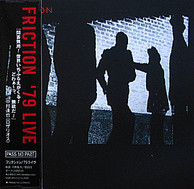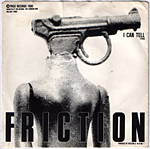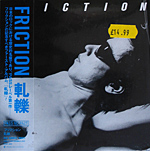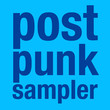Julian Cope’s Album of the Month

Friction'79 Live
AOTM #92, January 2008ce
Released 2005 on Pass Records
- Automatic-Fru (4.35)
- Pistol (3.17)
- Big-S (3.23)
- Kagayaki (4.28)
- A-Gas (2.43)
- Cool Fool (3.15)
- Cycle Dance (3.00)
- I Can Tell (3.51)
- Out (6.51)
Note: Friction was a late ‘70s Tokyo band that missed a place in JAPROCKSAMPLER on account of their having commenced their career just over a year later than that book’s self-imposed time limits. However, two of the band’s members – Reck and Chico Hige – featured in earlier bands 3/3 and  , both of whom appear in the book’s Top 50 Album Reviews, at #43 and #48 respectively.
, both of whom appear in the book’s Top 50 Album Reviews, at #43 and #48 respectively.
 , both of whom appear in the book’s Top 50 Album Reviews, at #43 and #48 respectively.
, both of whom appear in the book’s Top 50 Album Reviews, at #43 and #48 respectively.Whatever
When this excellent live album first surfaced a coupla years ago, I gots to admit it was a delightful revelation to me to experience Friction sounding as I imagine their leader Reck had originally intended. Indeed, with three decades and several oceans between us, and the dryness of their original studio sound herein replaced by the inevitable sonic spillage of a cheap concert recording, the catchiness of Friction’s racket finally made perfect sense, as Reck’s driving bass melded together with Chico Hige’s drums and Tsunematsu Masatoshi’s splashy-scratchy guitar to create a triple-headed post-punk behemoth. Heck, even Reck’s overly arch J. Rotten vocals now sounded less like Butler Rep’s dental drool and more like a genuine lead vocalist proposition, as really fucking catchy Japanglish choruses – admittedly often of barely more than a coupla duplicated words’ duration – emerged from the dungeonous gloop. But whereas the repeated vocals of songs such as ‘A-Gas’ (‘Gas mask, gas gas gas, gas tank, gas gas gas, anarchy’) and ‘Cycle Dance’ (‘Red light switch, black light switch, white light switch, switch, switch, switch, switch’) added little more than a glimpse of humanoid personality to Friction’s dislocated ‘Cloud 149’-meets-NO NEW YORK muse, elsewhere Reck’s still highly minimalist vocals contained choruses catchily hefty enough to corral momentarily some of the wild atonal funk tableaux into which they had been released1. For example, however much the jarring skronk of ‘Cool Fool’ tried to alienate the listener with its bombardment of Japanese verse lyrics, Reck was smart enough to render the song unforgettable after just one listen with his ultra-sardonic repeated English pay-off: “Oh baby, you’re so cool, fool”. Similarly, ‘Automatic-Fru’ followed the same formula; Reck belly-aching on in Japanese for a coupla minutes before tying it all up in English again with the gloriously catchy so-called chorus: “Style, style, Japanese style, style, style, Japanese style’. Even better, ‘Big-S’ captured the on-and-on-and-fucking-on nihilism of the time in the most poppy (and weirdly translated) manner imaginable:
“You wanna suicide in your room,
You wanna suicide in your city,
You wanna suicide in your country,
You wanna suicide on your TV set,
You wanna suicide on your planet,
You wanna suicide on your phone.”
Man, if Richard Hell’s BLANK GENERATION LP had managed even just one chorus as memorable as that sucker, we’d all still be spinning the disc2. Even the live versions of Friction’s boringly derivative debut 7” single (‘I Can Tell’ b/w ‘Pistol’) gain considerably from the graininess of this concert recording, ‘Pistol’ sounding especially fucking riotous here. Get your mits on a copy of this live album and pronto, Tonto… 35 minutes and 9 songs is very Van Halen and very AC/DC, dontcha thunk? But does the success of this live record mean the first studio LP is now worthy of a re-appraisal? Back in 1980, as well as being busy with my own career and in light of that first Friction 7” having been such a big disappointment, I really hadn’t paid much attention to it. At the time, the LP had to me sounded far too much like an admittedly ingenious but cynical case of cultural kleptomania, a too simplistic ploy to conflate the crankiness of 1978’s PIL/Banshees and New York No Wave noise with the punk ramalama of the previous year’s Pistols and Void Oids. Fabulous if yooz the only purveyor of such a sound, but being at that time a Liverpool snotbag of epic proportions, I felt that Friction were peddling precisely the same formula as that which 90% of my then contemporaries were barfing out (yeah, I’ll admit I was wrong wrong wrong, but I think you can forgive my mashed brain for misreading the overall sitch as I’d spent most of late ’78 and all of ’79 on the same bills as scratchy guitarmeisters A Certain Ratio, Joy Division, Crispy Ambulance, Wire, Gang of Four, Scritti Politti and the Bunnymen3). However, with 20/20 hindsight and my continuing fascination for the manner in which the Japanese send every Occidental trend through their own rigorous Nihonese filter, much of that Friction debut LP now sounds remarkably fresh and inventive. And although ‘I Can Tell’ and ‘No Thrill’ (a wholly pointless ESG copycat instrumental) still bore me stiff, the LP versions of ‘Cool Fool’ and ‘Big-S’ positively vibrate with an ectoplasmic energy all their own. Moreover, the studio versions of ‘Cycle Dance’ and ‘Out’ are a whole new thing, both being suffused with sub-sub-sub-Junior Walker sax, courtesy of drummer Chico Hige. Indeed, ‘Out’ concludes the album beautifully and artfully, like Van Der Graaf Generator during their NADIR’S BIG CHANCE-period playing Flipper’s ‘Sex Bomb (My Baby)’ in a Berlin disco. Git down!
History

I Can Tell 7" (1979)

FRICTION (1980)
 (AKA Maru Sankaku Shikaku), a wild septet led by former Murahatchibu4 drummer and communist street activist Kant Watanabe. Although
(AKA Maru Sankaku Shikaku), a wild septet led by former Murahatchibu4 drummer and communist street activist Kant Watanabe. Although  performed their shows only on the streets of Tokyo’s Shinjuku district, they also released three sub-sub-sub-Amon Düül commune LPs5 between 1971-73, each sounding as ramshackle and over-recorded as the other. Thereafter, Reck and Chicho Hige quit the ensemble to form the UFO/Stooges-influenced power trio 3/3 with Kohji ‘Tôhchan’ Miura, another former member of ? ? ? on bass, playing sporadic gigs with such harsh-sounding festival bands as Yellow, Gedo, Too Much and The M, loose biker rock aggregations made up of former commune members. Throughout 1975, 3/3 cut a whole album’s worth of lo-fi demos before Reck and Chico Hige quit Japan for New York some time during the punk thing. However, as the high point of their New York stay was Reck’s brief tenure as bass player in the final incarnation of Lydia Lunch’s Teenage Jesus & the Jerks, the pair opted to return to Japan in 1979 as heralds of the new sound. Seemingly not wishing to miss one single so-called New Wave move, Reck and Chico Hige named their new Tokyo band after a MARQUEE MOON-period Television classic tune and Reck cast himself thereafter as your all purpose Final Solution none-more-black Nihonese nihilist6. And what an act of genius his decision has turned out to be! By first divining then covering all the most essential ‘77/’78 bases, Reck has been able to demand that history be more than kind to himself and his cohorts. Dammit, (as I mentioned before) with three decades and several oceans between us, Reck’s catch-all vision of the West’s 1977-78 period Lutheran Re-Adjustment has revealed itself as one of the truest, nay, the truest that we could wish for. Listen to these Friction albums and for sure you’ll also hear snatches of early Subway Sect, early ATV, ‘Little Johnny Jewel’, mucho Pere Ubu (Hearthan period, natch), Mars, the Contortions, even Patti Smith’s ‘Gloria’. But, unlike other similarly motivated-but-far-less-talented overseas ensembles (eg: compare Friction’s arsey gonaddism with the always enjoyable but mostly Sun Reader punk pastiches of Denmark’s The Sods), what shows Reck to have been a true motherfucker was that he was smart enough (okay, and OLD enough) to know what musical elements to keep OUT of his mighty distillation process, forever displaying an uncanny ability to subsume all of those aforementioned artists into Friction’s musical stew and still have the result sound like nothing other than themselves. Such an obsessive thoroughness towards his cultural research was bound to elevate Reck’s work above that of his contemporaries. But it was the combination of his experience on the NY scene with his Crass-style grounding in a previous protest movement that set Friction head and shoulders above the rest. For, paradoxical as it may appear, the Punk movement of 1977-8 was for most (J. Rotten included) not the death of Hippie, but rather Hippie Re-Awakened and Re-Tailored. And the power at the heart of Reck’s nihilism was still entirely based on a fierce Utopianism. Paradoxical for sure. But true nonetheless.
performed their shows only on the streets of Tokyo’s Shinjuku district, they also released three sub-sub-sub-Amon Düül commune LPs5 between 1971-73, each sounding as ramshackle and over-recorded as the other. Thereafter, Reck and Chicho Hige quit the ensemble to form the UFO/Stooges-influenced power trio 3/3 with Kohji ‘Tôhchan’ Miura, another former member of ? ? ? on bass, playing sporadic gigs with such harsh-sounding festival bands as Yellow, Gedo, Too Much and The M, loose biker rock aggregations made up of former commune members. Throughout 1975, 3/3 cut a whole album’s worth of lo-fi demos before Reck and Chico Hige quit Japan for New York some time during the punk thing. However, as the high point of their New York stay was Reck’s brief tenure as bass player in the final incarnation of Lydia Lunch’s Teenage Jesus & the Jerks, the pair opted to return to Japan in 1979 as heralds of the new sound. Seemingly not wishing to miss one single so-called New Wave move, Reck and Chico Hige named their new Tokyo band after a MARQUEE MOON-period Television classic tune and Reck cast himself thereafter as your all purpose Final Solution none-more-black Nihonese nihilist6. And what an act of genius his decision has turned out to be! By first divining then covering all the most essential ‘77/’78 bases, Reck has been able to demand that history be more than kind to himself and his cohorts. Dammit, (as I mentioned before) with three decades and several oceans between us, Reck’s catch-all vision of the West’s 1977-78 period Lutheran Re-Adjustment has revealed itself as one of the truest, nay, the truest that we could wish for. Listen to these Friction albums and for sure you’ll also hear snatches of early Subway Sect, early ATV, ‘Little Johnny Jewel’, mucho Pere Ubu (Hearthan period, natch), Mars, the Contortions, even Patti Smith’s ‘Gloria’. But, unlike other similarly motivated-but-far-less-talented overseas ensembles (eg: compare Friction’s arsey gonaddism with the always enjoyable but mostly Sun Reader punk pastiches of Denmark’s The Sods), what shows Reck to have been a true motherfucker was that he was smart enough (okay, and OLD enough) to know what musical elements to keep OUT of his mighty distillation process, forever displaying an uncanny ability to subsume all of those aforementioned artists into Friction’s musical stew and still have the result sound like nothing other than themselves. Such an obsessive thoroughness towards his cultural research was bound to elevate Reck’s work above that of his contemporaries. But it was the combination of his experience on the NY scene with his Crass-style grounding in a previous protest movement that set Friction head and shoulders above the rest. For, paradoxical as it may appear, the Punk movement of 1977-8 was for most (J. Rotten included) not the death of Hippie, but rather Hippie Re-Awakened and Re-Tailored. And the power at the heart of Reck’s nihilism was still entirely based on a fierce Utopianism. Paradoxical for sure. But true nonetheless.FOOTNOTES:
- Okay, they still weren’t exactly real pop choruses. But they did truly inject structure into the songs, somewhat on the lines of the Rolling Stones’ Uber-linear and Germanic disco song ‘Shattered’, released one year previously on SOME GIRLS.
- Better still, all those ancient TV punk pundits wouldn’t have to keep mentioning Hell’s brief role in Madonna’s vile movie DESPERATELY SEEKING SUSAN just to remind us who he was.
- Fucking hell, just goggling at that list of Keith Levine-o-philes, it’s no wonder I kicked out Mick Finkler in June 1980!
- The Murahatchibu story is protracted but essential to early ‘70s Japan, and is told in detail in JAPROCKSAMPLER (pages 117-127).
- These three LPs were released in 2003CE as a 3CD set by Tokyo’s Captain Trip Records. The set appeared at #48 in my JAPROCKSAMPLER Top 50.
- Even sartorially, this Reck druid was smart enough to keep away from the dreaded and Soon-to-represent-only-the-Knack’n’the Cars skinny tie.
Selected Discography
‘I Can Tell’ b/w ‘Pistol’ 7” (Pass 1979)
FRICTION (Pass 1980)
’79 LIVE (Pass 2005)

 Early Soft Machine (1966-68)
Early Soft Machine (1966-68) 5-Track
5-Track The Godlike Genius of Pärson Sound
The Godlike Genius of Pärson Sound Psychick TV
Psychick TV Postpunk sampler 2
Postpunk sampler 2 Postpunk sampler
Postpunk sampler DETROITROCK SAMPLER
DETROITROCK SAMPLER HARDROCK SAMPLER
HARDROCK SAMPLER Li Jianhong
Li Jianhong The Routes
The Routes Chairmen Of The Board
Chairmen Of The Board Evil Acidhead
Evil Acidhead Henry Wolff & Nancy Hennings
Henry Wolff & Nancy Hennings Silver Apples
Silver Apples OMD
OMD XTC
XTC Fleetwood Mac
Fleetwood Mac Fleetwood Mac
Fleetwood Mac Van Morrison
Van Morrison Vsevelodon the Bigot Nest (Vsevelod and the Big Nest)
Vsevelodon the Bigot Nest (Vsevelod and the Big Nest)